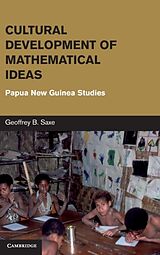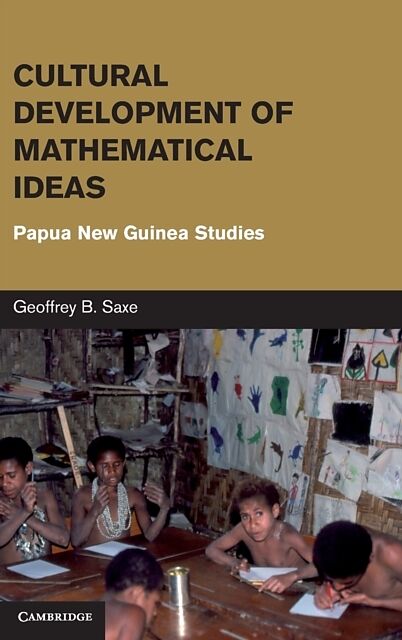Cultural Development of Mathematical Ideas
Einband:
Fester Einband
EAN:
9780521761666
Untertitel:
Papua New Guinea Studies
Autor:
Geoffrey B. Saxe
Herausgeber:
Cambridge University Press
Anzahl Seiten:
400
Erscheinungsdatum:
15.11.2012
ISBN:
0521761662
Informationen zum Autor Dr Geoffrey Saxe has conducted research on mathematical cognition and culture in a variety of settings, including remote parts of Papua New Guinea, urban and rural areas of northeastern Brazil and elementary and middle school classrooms in the United States. His prior books include Culture and Cognitive Development: Studies in Mathematical Understanding (1991) and Social Processes in Early Number Development (with S. Guberman and M. Gearhart, 1987). He is currently a professor at the Graduate School of Education, University of California, Berkeley. Klappentext Geoffrey Saxe traces the emergence of numerical representations and ideas as people participate in collective practices of daily life. "...This book is a tour de force in moving theory toward a fully historical, social and activity based account of cultural and developmental change. The case presented is particular to an "exotic" (to us) group, but the theoretical apparatus developed has wide-ranging application. This book isn't about "them" it is about "us" as well. It is an important contribution to developmental theory." --Joseph Glick, The Graduate Center, City University of New York, Human Development "...comprehensive and well documented... should appeal to a wide audience beyond cultural anthropology and cultural psychology... it will delight... this book should be of interest worldwide..." --Pierre R. Dasen, University of Geneva, Alterstices "deeply impressed with its contributions to our understanding of cognitive development." -- Book Award from the Cognitive Development Society Zusammenfassung Through an ethnographic study of a Papua New Guinea cultural group! Geoffrey Saxe traces the emergence of numerical representations and ideas as people participate in collective practices of daily life. His findings will be useful for understanding shifting representational forms and emerging cognitive functions in any human community. Inhaltsverzeichnis Introduction; Part I. The Origins of Number-Enduring Questions: 1. Culture-cognition relations; 2. Cultural forms of number representation used in Oksapmin communities; Part II. Economic Exchange: 3. Collective practices of economic exchange: a brief social history; 4. Reproduction and alteration of numerical representations; 5. Reproduction and alteration in currency token representations; 6. Representational forms, functions, collective practices, and fu: a microcosm; Part III. Schooling: 7. A brief history: collective practices of schooling in Oksapmin; 8. Unschooled children's developing uses of the body system; 9. Children's adaptations of the body system in school in 1980: an unintended consequence of postcolonial schooling; 10. About twenty years later: schooling and number; 11. Teachers and students as (unintentional) agents of change; Part IV. Towards an Integrated Treatment of Socio-Historical and Cognitive Developmental Processes: 12. What develops? A focus on form-function relations; 13. How do quantification practices develop?; 14. Why do form-function relations shift?; Epilogue....
Klappentext
Geoffrey Saxe traces the emergence of numerical representations and ideas as people participate in collective practices of daily life.
Zusammenfassung
Through an ethnographic study of a Papua New Guinea cultural group, Geoffrey Saxe traces the emergence of numerical representations and ideas as people participate in collective practices of daily life. His findings will be useful for understanding shifting representational forms and emerging cognitive functions in any human community.
Inhalt
Introduction; Part I. The Origins of Number-Enduring Questions: 1. Culture-cognition relations; 2. Cultural forms of number representation used in Oksapmin communities; Part II. Economic Exchange: 3. Collective practices of economic exchange: a brief social history; 4. Reproduction and alteration of numerical representations; 5. Reproduction and alteration in currency token representations; 6. Representational forms, functions, collective practices, and fu: a microcosm; Part III. Schooling: 7. A brief history: collective practices of schooling in Oksapmin; 8. Unschooled children's developing uses of the body system; 9. Children's adaptations of the body system in school in 1980: an unintended consequence of postcolonial schooling; 10. About twenty years later: schooling and number; 11. Teachers and students as (unintentional) agents of change; Part IV. Towards an Integrated Treatment of Socio-Historical and Cognitive Developmental Processes: 12. What develops? A focus on form-function relations; 13. How do quantification practices develop?; 14. Why do form-function relations shift?; Epilogue.

Leider konnten wir für diesen Artikel keine Preise ermitteln ...
billigbuch.ch sucht jetzt für Sie die besten Angebote ...
Die aktuellen Verkaufspreise von 6 Onlineshops werden in Realtime abgefragt.
Sie können das gewünschte Produkt anschliessend direkt beim Anbieter Ihrer Wahl bestellen.
Loading...
Die aktuellen Verkaufspreise von 6 Onlineshops werden in Realtime abgefragt.
Sie können das gewünschte Produkt anschliessend direkt beim Anbieter Ihrer Wahl bestellen.
| # | Onlineshop | Preis CHF | Versand CHF | Total CHF | ||
|---|---|---|---|---|---|---|
| 1 | Seller | 0.00 | 0.00 | 0.00 |
